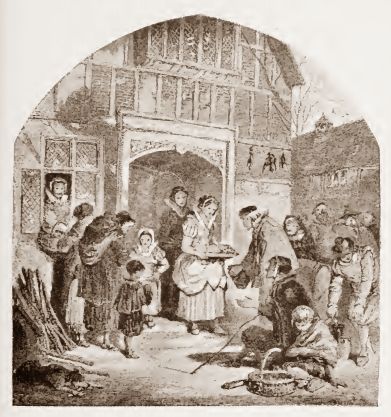nn
n
n
n
n In England (and some of the Commonwealth nations),nthe day after Christmas Day is known as Boxing Day. It has nothing to do withnpugilism and fighting with your kith and kin, or disposing of all the cardboardnboxes that your Christmas presents came in, but refers instead to the ‘boxes’,nor Christmas donations, that were once given by well-to-do to their servants,ntradesfolk and the deserving poor.
n
n
n
 |
| Handing out the Christmas Boxes |
n
n
n
nBy some accounts, the practice began withnboxes that were carried on board ships that went on lengthy voyages, and intonwhich donations were placed to pay a priest to say masses for the safety of thenvessel – this box would not be opened until the ship returned safely tonharbour. The poorer passengers would beg money from the rich, with which theynmight make donations of their own and carried smaller boxes, into the slots ofnwhich the collected coins were dropped. This derivation, it must be said, seemsnunlikely, but the practice of the rich giving gifts to the poor at Christmasndates back to at least the Middle Ages.
n
n
n
| A Hand Out for a Hand-out |
n
n
n
nIn The Book of Christmas (1836),nThomas Kibble Hervey notes that the practice of making a list of tradespersonsnand others who might have a claim to a Christmas-box was still in evidence butnwas, at that time, beginning to decline. He traces this to the abuses of thencustom that saw innumerable claims being made by all and sundry, not onlynfamily servants and trusted tradesmen, but just about anyone who provided anservice of any sort. Hervey writes that in London, on Boxing Day,
n
n
n
n“… everynstreet resounds with the clang of hall-door knockers. Rap follows rap, in rapidnsuccession,”n
n
n
nas a succession of claimants knocked on the doors, demandingntheir Christmas-boxes. Some of these roaming gangs went out with trumpets andndrums, to announce their arrival, as Samuel Pepys noted in his Diarynentry for December 28th 1668,
n
n
n
n“Up, called up by drumsnand trumpets; these things and boxes having cost me much moneynthis Christmas already, and will do more.”n
n
n
nOne hundred and fiftynyears later, Hervey records a similar case,
n
n
n
n“Called out by the parishnbeadle, dustmen, and charity-boys. The postman, street-sweepers,nchimney-sweepers, lamp-lighters, and waits, will all be sure to wait upon me.nThese fellows have cost me much money this Christmas, — and will do more, thennext.”n
n
n
n
n
| The Poor Children’s Christmas |
n
n
n
nIn another case, Hervey writes of the indignation caused when, innaddition to the usual stream of the brewer, the baker, the watch, the beadles,nthe dustmen and all the other tradesmen, even the parish clerk turned up at hisndoor demanding half-a-crown. In some areas, the beadle would arrive bearing anprinted verse broadside, with wood engraved illustrations, which were known asnBellman’s Verses. These had, at one time, been honest, vernacular poetrynwritten in good faith, which were given in exchange for the Christmas-box, butnby the 1830s they had degenerated into cynical, manipulative, money-makingndoggerel, as mourned by Leigh Hunt, in his London Journal,
n
n
n
n“No, no! Give usnthe good old decrepit bellman’s verses, hobbling as their bringer, and takingnthemselves for something respectable, like his cocked-hat, — or give us none atnall.”n
n
n
n
n
| Leigh Hunt’s London Journal – December 24 1834 |
n
n
n
nA London printer had, from 1735, printed in excess of ten thousandncopies of his Bellman’s Verses each year but by the 1830s this number hadnfallen to less than three thousand, marking the passing of another oldnChristmas tradition. Another printed publication came on behalf of the Dustmen,nof all people, who issued certificates proclaiming their ‘right’ to a Christmasntip (and distancing themselves from the less-deserving Scavengers). An examplenreads,
n
n
n
n“TO THE WORTHY INHABITANTS OF THE SOUTHAMPTON ESTATE.n
nLadies andnGentlemen, — At this season, when you are pleased to give to labouring men,nemployed in collecting your dust, a donation, called Christmas-box, advantagenof which is often taken by persons assuming the name of Dustmen, obtaining,nunder false pretences, your bounty, we humbly submit to your consideration tonprevent such imposition, to bestow no gift on any not producing a brass figurenof the following description—A Scotch Fifer, French horn, &c, between hisnlegs. — James Dee and Jerry Cane. — Southampton Paving Act—on the bell. —nContractor — Thomas Salisbury.n
nNo connexion with scavengers—Please not tonreturn this bill to any one.”n
n
n
n
n
| Boxing Day – London |
n
n
n
nAnother paper-based Boxing Day custom has gonenthe way of the Bellman’s Verses, that of the parish boys exhibiting examples ofntheir calligraphy on December 26th, in churches and schoolrooms, orntaken door-to-door and donations collected from admirers of the finenpenmanship.
n
n
n
| The Servants’ Christmas |
n
n
n
nBut there is one Boxing Day custom that has, thankfully, ceased tonbe followed. It was the custom, in some places, to present as a Christmas giftna young, black slave child, and advertisements were issued of theirnavailability – William Sandys condemns one such example of this ‘abomination’nin his Christmastide – its History, Festivals and Carols (1852),
n
n
n
n“Tonbe sold, a little mulatto, two years of age, very pretty, and well adapted forna festival present.”n
n
n
nLike Hunting the Wren, it’s a Christmas tradition thatnwe are glad to have seen the back of. nAnd good riddance.
nnn
n
n
n